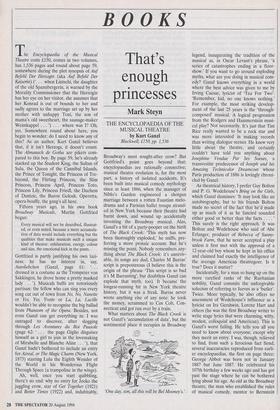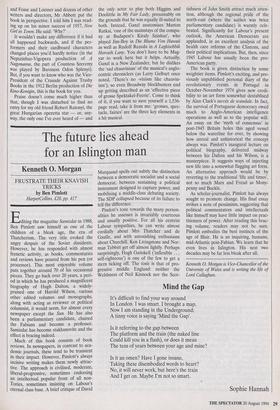BOOKS
That's enough princesses
Mark Steyn
THE ENCYCLOPAEDIA OF THE MUSICAL THEATRE by Kurt Ganzl Blackwell, £150, pp. 1,536 The Encyclopaedia of the Musical Theatre costs £150, comes in two volumes, has 1,536 pages and round about page 59, somewhere during the plot synopsis of Auf Befehl Der Herzogin (aka Auf Befehl Der Kaiserin) (` . when Lintschi, the daughter of the old Spannbergerin, is warned by the Morality Commissioner that the Herzogin has her eye on her visitor, she assumes that her Konrad is out of bounds to her and sadly agrees to the marriage set up by her mother with unhappy Toni, the son of mama's old sweetheart, the sausage-maker Weisskappel . . . ') . . where was I? Oh, yes. Somewhere round about here, you begin to wonder: do I need to know any of this? As an author, Kurt Ganzl believes that, if it isn't Herzogs, it doesn't count. The Almanach de Gotha are pikers com- pared to this boy. By page 59, he's already stacked up the Student King, the Sultan of Sulu, the Queen of the Cannibal Islands, the Prince of Tonight, the Princess of Tre- bizond, the Flirting Princess, the Slim Princess, Princess April, Princess Toto, Princess Lily, Princess Friedl, the Duchess of Dantzic, the Baron Golosh. Operetta, opera-bouffe, the gang's all here.
Fifteen years ago, in his own book Broadway Musicals, Martin Gottfried
began: Every musical will not be described, illustrat- ed, or even noted, because a mere accumula- tion of data would include everything but the qualities that make musicals such a unique kind of theatre: exhilaration, energy, colour and size, the emotional kick in the pants.
Gottfried is partly justifying his own lazi- ness: he has no interest in, say, Autoliebchen (Ganzl, page 61: . dressed in a costume as the Trompeter von Sakkingen, he drove home a pretty masked lady . . . '). Musicals buffs are notoriously partisan: the fellow who can sing you every song cut out of town from No, No, Nanette or Yes, Yes, Yvette or La, La, Lucille wouldn't be able to recognise the big ballad from Phantom of the Opera. Besides, not even Ganzl can get everything in: I was outraged to discover, after slogging through Les Aventures du Roi Pausole (page 62: . . . the page Giglio disguises himself as a girl to join in the lovemaking of Mirabelle and Blanche Aline . . . '), that Ganzl hadn't bothered to include an entry for Azreal, or The Magic Charm (New York, 1873) starring Lulu the Eighth Wonder of the World in his Wonderous Flight Through Space (a trampoline in the wings).
Ah, well, once you start quibbling, there's no end: why no entry for Jocko the juggling crow, star of Get Together (1921) and Better Times (1922) and, indubitably, Broadway's most sought-after crow? But Gottfried's point goes beyond that: encyclopaedias are rationally connective; musical theatre evolution is, for the most part, a history of isolated accidents. It's been built into musical comedy mythology since at least 1866, when the manager of Niblo's Garden engineered a shotgun marriage between a rotten Faustian melo- drama and a Parisian ballet troupe strand- ed in New York because their theatre had burnt down, and wound up accidentally inventing the Broadway musical. Alas, Ganzl's a bit of a party-pooper on the birth of The Black Crook: `This myth has now been thoroughly exploded,' he sniffs, pre- ferring a more prosaic account. But he's missing the point. Nobody remembers any- thing about The Black Crook: it's unreviv- able, its songs are dud, Charles M Barras' script is preposterous (I believe this is the origin of the phrase 'This script is so bad it's M Barrassing', but doubtless Ganzl can explode that myth, too). It became the longest-running hit in New York theatre history, but it was a freak. Barras never wrote anything else of any note: he took the money, scrammed to Cos Cob, Con- necticut and got run over by a train.
What matters about The Black Crook is not Ganzl's 'accumulation of data', but the sentimental place it occupies in Broadway `One day, son, all this will be Bel Mooney's.' legend, inaugurating the tradition of the musical as, in Oscar Levant's phrase, 'a series of catastrophes ending in a floor- show.' If you want to go around exploding myths, what are you doing in musical com- edy? Ganzl knows everything in a world where the best advice was given to me by Irving Caesar, lyricist of 'Tea For Two': `Remember, kid, no one knows nothing.' For example, the most striking develop- ment of the last 25 years is the 'through- composed' musical. A logical progression from the Rodgers and Hammerstein musi- cal play? Not necessarily. It's just that Tim Rice really wanted to be a rock star and was more interested in making records than writing dialogue scenes. He knew very little about the theatre, and certainly couldn't have told you anything about Josephine Vendue Par Ses Soeurs, a transvestite predecessor of Joseph and his Amazing Technicolor Dreamcoat whose Paris production of 1886 is lovingly chroni- cled by Ganzl.
As theatrical history, I prefer Guy Bolton and P. G. Wodehouse's Bring on the Girls, which Ganzl dismisses: 'It may look like an autobiography, but to his friends Bolton made no secret of the fact that he'd made up as much of it as he fancied sounded either good or better than the facts . . . . ' This surely is the right approach. It was Bolton and Wodehouse who said of Abe Erlanger, producer of Rebecca of Sunny- brook Farm, that he never accepted a play unless it first met with the approval of a 12-year-old boy whom he kept in his office and claimed had exactly the intelligence of the average American theatregoer. Is it true? Does it matter?
Incidentally, for a man so hung up on the more rarefied ranks of the Ruritanian nobility, Ganzl commits the unforgivable solecism of referring to Jeeves as a 'butler'. Twice. More typically, he also offers no assessment of Wodehouse's influence as a lyricist on Ira Gershwin, Lorenz Hart and others (he was the first Broadway writer to write stage lyrics that were charming, witty, modest, colloquial and American). This is Ganzl's worst failing. He tells you all you need to know about everyone, except why they merit an entry. I was, though, relieved to find, from such a ferocious fact fiend, several inaccuracies reproduced from earli- er encyclopaedias, the first on page three: George Abbot was born not in January 1887 but June 1887. He celebrated his 107th birthday a few weeks ago and has got past the stage where he can be bothered lying about his age. As old as the Broadway theatre, the man who established the rules of musical comedy, mentor to Bernstein and Fosse and Loesser and dozens of other writers and directors, Mr Abbott put the book in perspective. I told him I was read- ing up on his minor success of 1957, New Girl in Town. He said: 'Why?'
It wouldn't make any difference if it had all happened backwards, and if the per- formers and their cardboard characters changed places you'd hardly notice (in the Nepszinhaz-Vigopera production of A Nagymama, the part of Countess Szeremy was played by Baroness Odon Splenyi). But, if you want to know who was the Vice- President of the Crusade Against Trashy Books in the 1912 Berlin production of Die Kino-Konigin, this is the book for you.
Praise doesn't come much higher than that, though I was disturbed to find no entry for my old friend Robert Ratonyi, the great Hungarian operetta star — or, any- way, the only one I've ever heard of — and the only actor to play both Higgins and Doolittle in My Fair Lady, presumably on the grounds that he was equally ill-suited to both. Instead, Ganzl anatomises Marton Ratkai, 'one of the mainstays of the compa- ny at Budapest's Kiraly Szinhaz', who played Jim-Boy in Die Blume Von Hawaii as well as Rudolf Rezeda in A Legkisebbik Horvath Lany. You don't have to be Mag- yar to work here but it helps. Actually, Ganzl is a New Zealander, but he dislikes the 'sad chauvinism' of the musical's anglo- centric chroniclers (as Larry Gelbart once noted, 'There's no -vinism like chauvin- ism'), so even Broadway blockbusters end up getting described as an 'effective piece of grosse Spektakel-Feerie'. Come to think of it, if you want to save yourself a 1,536- page read, take it from me: 'grosses, spec- tacle, fairies' are the three key elements in a hit musical.



















































 Previous page
Previous page